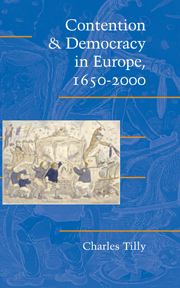6 - SWITZERLAND AS A SPECIAL CASE
Published online by Cambridge University Press: 29 May 2010
Summary
As we have seen repeatedly, 350 years go quickly at the national and international scales. Our overflights of European history afford virtual views of important trends and variations in democratization, but they do not display crucial change mechanisms close up. To see the mechanisms at work more clearly, let us turn up the magnification. Switzerland over the nineteen years from 1830 to 1848 offers a marvelous microcosm for the study of de-democratization and democratization. It also allows us to watch Europe's oldest continuously functioning democratic regime undergo a formative set of transitions. Contrary to Switzerland's reputation as a stodgy, stuffy, but civil political backwater, we witness bitter division and armed conflict. Far from easing into democracy as a consequence of age-old habits and culture, we see Switzerland fashioning democratic institutions as a contested and improvised compromise solution to a revolutionary crisis (for general historical background, see Bonjour 1948; Bonjour, Offler, and Potter 1952; de Capitani 1986; Gilliard 1955; Gossman 2000; Kohn 1956).
Long a scattering of belligerent fiefs within successive German empires, most Swiss areas acquired de facto independence at the Peace of Basel (1499) and de jure recognition as a federation at the Peace of Westphalia (1648). Their control of major transalpine routes for trade, travel, and troop movements gave Switzerland's segments the means of political and commercial survival, but also made them objects of incessant intervention by neighboring powers.
- Type
- Chapter
- Information
- Contention and Democracy in Europe, 1650–2000 , pp. 168 - 205Publisher: Cambridge University PressPrint publication year: 2003

